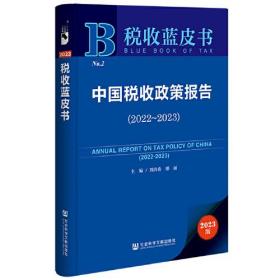
The Blue Book of Tax: Annual Report on Tax Policy of China (2022-2023) summarizes the tax policies in 2021 while casting a strategic eye towards the tax policies and revenue of 2022. Revolving around “innovative, coordinated, green, open and shared development,” this report systematically reviews the tax reforms set into motion since the 18th CPC National Congress in the context of the new development paradigm. Concluding on a forward-thinking note, it proposes recommendations for future reform based on current challenges.
In 2022, China implemented a new package of tax-and-fee policies centered on tax refunds, tax and fee reductions, and tax and fee holdover for the high-quality development of manufacturing. They lessened the fiscal load on SMEs and bolstered their S&T innovation, thereby effectively stabilizing corporate expectations and consolidating the foundation of the economy.
Since the 18th CPC National Congress, China has fully reflected the concept of “innovative, coordinated, green, open and shared development” in a series of tax reforms, so as to effectively catalyze the upgrading of both the economy and society, and forge a new development pattern.
Firstly, the new round of tax reforms has enriched the tax policies which spur innovation, thereby effectively invigorating the innovative dynamism of market players and boosting the quality of innovation.
Secondly, a chain of reforms – encompassing broadening the tax base, streamlining tax rates, and refunding value-added tax credits – have further played the role of tax neutrality in the allocation of market resources and the coordinated development of the economy.
Thirdly, implementing the Environmental Protection Tax Law of the People’s Republic of China, alongside incentive policies for low-carbon and green development, has proven effective in improving the ecology and environment, pursuing the economical and intensive use of resources, and curtailing the rise in carbon emissions.
Fourthly, the steady increase in the volume of China’s foreign trade, coupled with the continuous rise in both scale and quality of foreign investment utilization, underscore the notable strides made by China’s tax policies in fostering a higher degree of opening up.
Fifthly, a tax environment that encourages fair competition and the distribution and adjustment way of sharing results have helped the economic “cake” to grow bigger and be distributed better. Looking ahead, we will further innovate tax policies to foster an innovation-friendly tax system; deepen the value-added tax reform towards coordinated development; establish a green tax system aimed at reducing emissions, minimizing pollution, and conserving resources; improve China’s tax system amidst globalization and international competition trends to raise its level of opening up; and create a fair tax system to foster fair tax collection and management, and capitalize on the positive role of tax fairness in promoting shared development as well as social fairness and justice.
Sixthly, aligned with rising wave of economic digitalization and financialization, we should redesign tax elements with a focus on reducing uncertainties and creating a soft tax system, so that the whole tax reform can be empowered by the new development philosophy.



